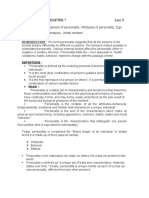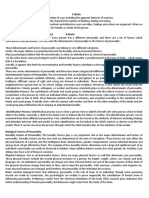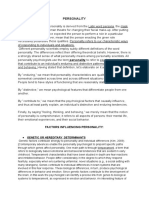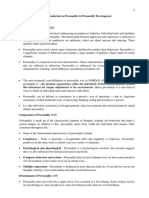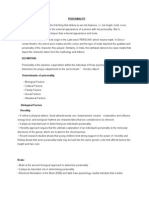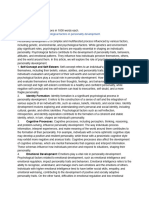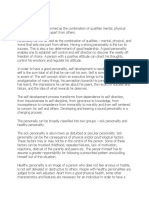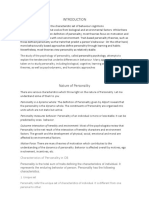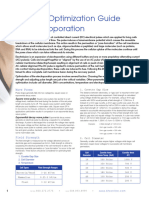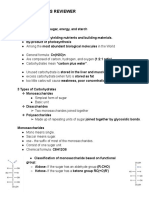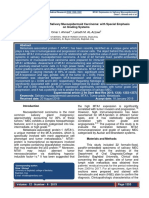Determinants of Personality
The determinants of personality are the various factors and influences that shape an
individual's unique pattern of thoughts, emotions, and behaviors. These determinants help
explain why individuals differ in their personalities and why they respond differently to
various situations. The key determinants of personality include Hereditary factors,
Environmental factors, Situational factors, Cultural factors, Social factors, etc.
I. Hereditary Factors
Heredity, also known as genetics, refers to the influence of genetic factors and biological
inheritance on an individual's personality. It involves the transmission of traits and
characteristics from parents to their offspring. Various aspects are considered regarding
heredity when it comes to the study of personality, some of them are:
1. Genetic Inheritance: The genetic makeup of an individual is a critical determinant of their
personality. Specific genes and combinations of genes can predispose individuals to certain
traits and behaviours. For example, genes may contribute to temperament, intelligence, and
susceptibility to mental health conditions.
2. Twin and Family Studies: Research on identical and fraternal twins, as well as family
studies, has provided substantial evidence for the hereditary basis of personality. These
studies have demonstrated that certain personality traits, such as introversion-extroversion
and neuroticism, tend to have a genetic component.
3. Gene-Environment Interplay: It is important to note that genetics interact with
environmental factors. Genes can influence how individuals respond to their surroundings
and the experiences they encounter. This interaction is known as gene-environment
interplay and plays a crucial role in shaping personality.
II. Environmental Factors
Environmental factors encompass the external influences and experiences that individuals
encounter throughout their lives. These factors can significantly shape and mold an
individual's personality. Here are key aspects of environmental determinants:
1. Family Environment: The family is often the primary socialising agent in a person's life.
The way parents raise their children, including their parenting style and family dynamics, can
profoundly influence personality development. For example, a nurturing and supportive
family environment can foster self-confidence and a positive self-concept.
2. Cultural and Societal Influences: Cultural norms, values, and societal expectations impact
how individuals perceive themselves and others. Cultural factors, including cultural values
and social norms, shape personality traits and behaviours. For instance, collectivist cultures
may emphasisze conformity and interdependence, while individualist cultures may promote
autonomy and self-expression.
�3. Peer Groups and Socialisation: Peer groups, friends, and social interactions outside the
family environment play a pivotal role in personality development. Peer influence can shape
attitudes, values, and behaviours, particularly during adolescence when peer acceptance is
highly valued.
III. Situational Factors
Situational factors refer to the immediate context or circumstances an individual encounters.
While personality is generally considered relatively stable, situations can temporarily
influence behavior and expression.
1. Stress and Coping Mechanisms: High-stress situations, such as academic exams, job
interviews, or personal crises, can evoke different aspects of an individual's personality.
People may exhibit resilience, adaptability, or anxiety depending on the situation and their
coping mechanisms.
2. Role and Context: The roles individuals assume in various situations can lead to
role-specific behaviors. For example, someone may exhibit assertiveness and leadership
traits in a work environment but be more passive in social settings.
3. Mood and Emotional State: An individual's mood and emotional state at a given moment
can affect their behaviour and expression. For instance, someone in a cheerful mood may
exhibit extroverted traits, while someone feeling anxious may display introverted tendencies.
IV. Cultural Factors
Cultural factors encompass the societal and cultural environment in which an individual is
immersed. These factors shape an individual's values, beliefs, and behaviours. Key aspects
of cultural factors include:
1. Cultural Values: Each culture has its unique set of values and beliefs that influence an
individual's worldview. These values can encompass concepts like collectivism versus
individualism, egalitarianism, and the importance of tradition.
2. Social Norms: Cultural norms dictate acceptable behaviour within a specific society or
community. These norms impact an individual's choices and actions in various social
contexts, including family, work, and social interactions.
V. Social Factors
Social factors encompass the broader societal context and interpersonal relationships that
an individual experiences throughout their life. These factors include:
1. Peer Influence: The influence of friends and peer groups can significantly shape an
individual's personality, values, and behaviours. Peer pressure, social acceptance, and the
desire for social belonging can impact decision-making.
�2. Social Support: The quality and nature of an individual's social relationships, including
friendships and support networks, have a profound effect on emotional well-being and can
influence personality traits like resilience and self-esteem.








